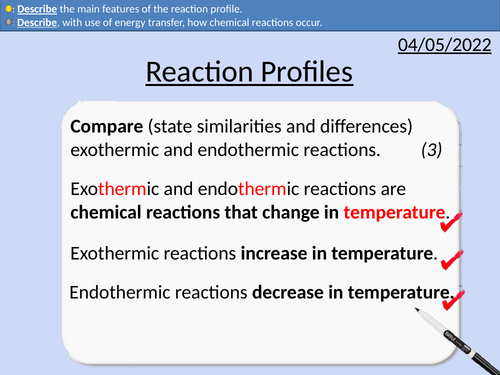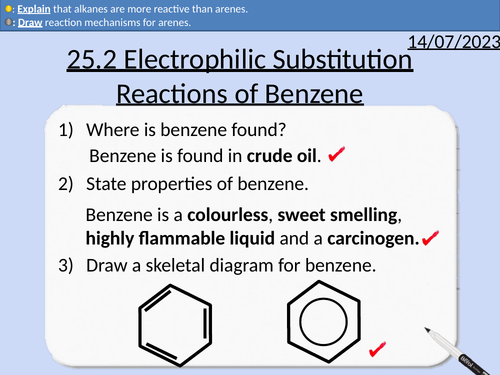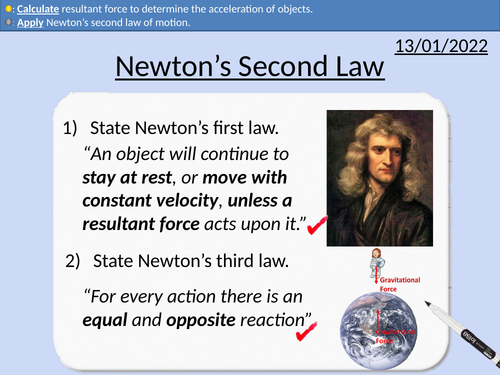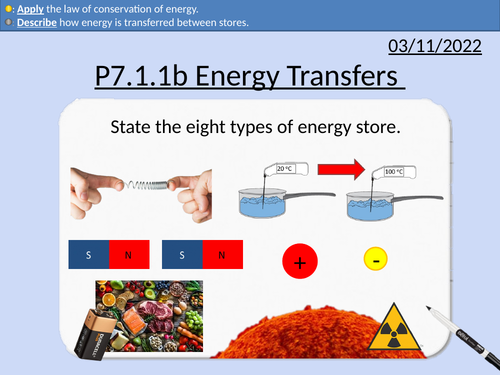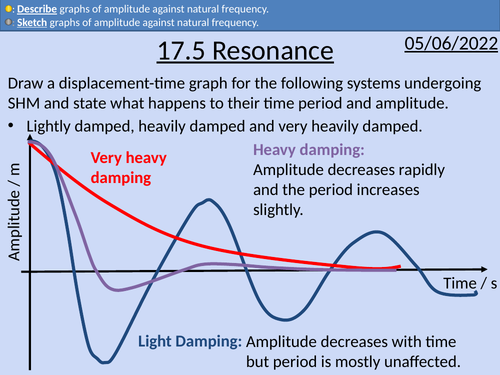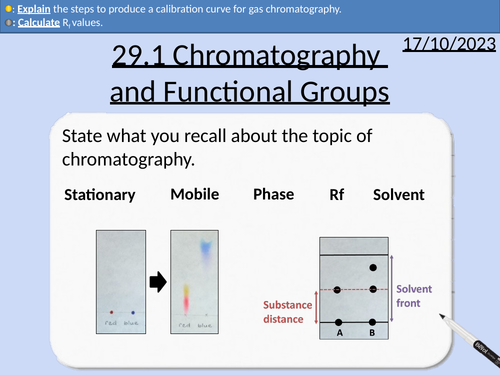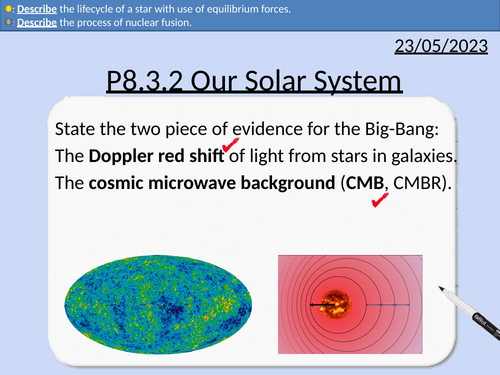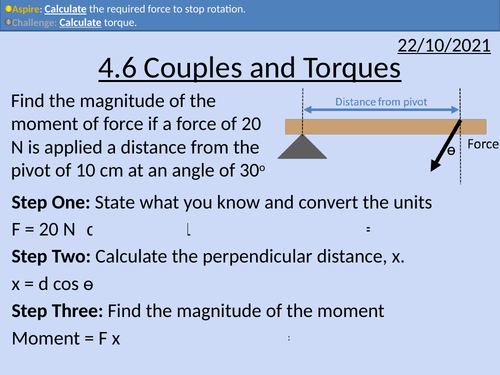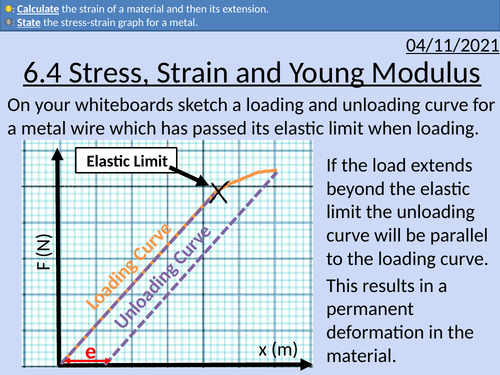496Uploads
162k+Views
70k+Downloads
All resources
Bundle

GCSE OCR Chemistry C3.1 Introducing Chemical Reactions
Resources for C3.1 GCSE OCR Chemistry Gateway 9-1 Triple and Combined (Higher and Foundation) is covered in this material.
Includes:
Formulae of elements and molecules
Formulae of ionic compounds
Conservation of mass
Chemical Equations
Half equations and ionic equations
The mole
Mole calculations

GCSE Chemistry: Reaction Profiles
This PowerPoint presentation with worked examples and student questions covers:
• Reaction profiles for exothermic and endothermic
• Energy stores of particles and surroundings
• Activation energy
• Describing the main features of reaction profiles.

OCR AS Chemistry: Nomenclature of Organic Compounds
OCR AS Chemistry: 11.2 Nomenclature of Organic Compounds
This PowerPoint is a whole lessons included with student activities, animated answers, homework questions with answers provided.
This lesson covers:
Aliphatic, alicyclic, and aromatic compounds.
Naming organic compounds
Drawing organic compounds
Functional Groups
Alkane
Alkene
Alkyne
Alcohols
Haloalkane
Aldehyde
Ketone
Carboxylic Acid
Ester
Amine
Nitrile

A Level Chemistry: Electrophilic Substitution Reactions of Benzene
OCR A level Chemistry: 25.2 Electrophilic Substitution Reactions of Benzene
This PowerPoint is a whole lesson included with student activities, animated answers, homework questions with answers provided.
This lesson covers:
Defining an electrophile
Substitution reactions
Nitration of Benzene
Reaction mechanisms
Halogenation of Benzene
Common Halogen Carriers
Friedel-Crafts Alkylation Reactions
Acyl Chloride
Acylation Reactions of Benzene
Reactivity of Alkenes and Arenes
Bundle

GCSE OCR Physics: P6 Radiation
All resources for GCSE OCR Physics Gateway 9-1 P6 Radiation.
Triple and combined (Higher and Foundation) is covered in this material.
Atoms and Isotopes
Alpha, Beta, and Gamma Radiation
Nuclear Equations
Half-life
Radiation and the body
Nuclear Fusion
Nuclear Fission
Radiation in and out of atoms

OCR A level Physics: Life Cycles of Stars
OCR A level Physics: 19.2 Life Cycles of Stars
Module 5 Newtonian World and Astrophysics
This PowerPoint is a whole lesson included with student activities, animated answers, homework questions with answers provided.
This lesson covers:
Calculating mass in kg from solar mass
Life cycle of stars with a mass between 0.5 and 10 solar masses
Life cycle of stars with a mass above 10 solar masses
Pauli exclusion principle and electron degeneracy pressure
Red giants and white dwarfs
The Chandrasekhar limit
Red supergiants to black holes and neutron stars
Stellar nucleosynthesis

GCSE Physics: Speakers and Microphones
This lesson presentations covers OCR Gateway Physics 9-1 P4.2.6 Speakers and Microphones.
Definition of sound waves.
Structure and operation of a speaker.
Fleming’s left hand rule.
Structure and operation of a microphone.
Electromagnetic induction.
Comparison of speakers and motors.
Comparison of microphone and generators.
Comparing microphones and speakers
Bundle

GCSE OCR Physics: P2 Forces Full scheme
All resources for P2 GCSE OCR Physics Gateway 9-1.Triple and combined (Higher and Foundation) is covered in this material.
Includes:
Distance, time, and speed
Vectors and scalars
Acceleration
Distance-time graphs
Velocity-time graphs
Equations of motion and Kinetic Energy
Forces and interactions
Free-body Diagrams
Newton’s first law
Newton’s second law
Everyday forces and their effects
Momentum
Work and Power
Stretching springs
Stretching materials and storing energy
Gravitational Fields and Potential Energy
Turning Forces
Simple Machines
Hydraulics

GCSE Physics: Newton's Second Law
This presentation covers OCR Gateway Physics 9-1 P2.2.4
Newton’s Second Law in Mathematical Form
Proportionalities
Rearranging Equations
Student’s problems with answers
Exam style questions with solutions

GCSE Chemistry: Alkanes
This PowerPoint presentation with worked examples and student questions covers:
• Definition of hydrocarbons
• Carbon and hydrogen saturation
• Mnemonic device for naming alkanes
• Comparing complete and incomplete combustion
• Balancing complete combustion reactions

GCSE Physics: Energy transfers and Conservation of energy
This presentation covers OCR Gateway Physics 9-1 P7.1.1b Energy stores transfers and Conservation of energy.
This PowerPoint covers while including student activities and worked answers:
The law of conservation of energy.
The energy transfer pathways:
Mechanically – with forces
Electrically – with current
Heating by particles
Heating by radiation
Describing stores and transfers for:
Object projected upwards or up a slope,
A moving object hitting an obstacle,
An object being accelerated by a constant force,
A vehicle slowing down,
Bringing water to a boil in an electric kettle

OCR AS Chemistry: The Chemistry of Haloalkanes
OCR AS Chemistry: The Chemistry of Haloalkanes
This PowerPoint is a whole lessons included with student activities, animated answers, homework questions with answers provided.
This lesson covers:
Naming Haloalkanes
Classifying Haloalkanes (primary, secondary, tertiary)
Electronegativity
Reaction mechanism for hydrolysis
Rates of reactions for hydrolysis
Reaction conditions for hydrolysis

A level Chemistry: Chromatography and Functional Group Analysis
OCR A level Chemistry: 29.1 Chromatography and Functional Group Analysis
This PowerPoint is a whole lesson included with student activities, animated answers, homework questions with answers provided.
This lesson covers:
Thin layer chromatography (TLC)
Rf values
Gas chromatography (GC)
Gas chromatograms
Retention time and peak integrations
Calibration curves from retention time and relative peak area
Differentiation of functional groups: alkene, primary and secondary alcohols, aldehydes, cabonyl compounds, carboxylic acids, and haloalkes.

OCR AS Physics: Total Internal Reflection
OCR AS Physics A: Total Internal Reflection is a part of the Module 4: Electrons, Waves, and Photons. PowerPoint with worked examples and homework.
Bundle

GCSE OCR Physics: P2.2 Newton's Laws
All resources for P2.2 GCSE OCR Physics Gateway 9-1.Triple and comined (Higher and Foundation) is covered in this material.
Includes:
Forces and Interactions
Free Body Diagrams
Newton’s First Law
Newton’s Second Law
Everyday Forces
Momentum
Work Done and Power

GCSE Physics: The Solar System
This presentation covers OCR Gateway Physics 9-1 P8.3.2 Our Solar System
This PowerPoint is a whole lessons included with student activities and animated answers.
Structure of the solar system
Nuclear Fusion
Evolution of large stars
Evolution of Sun like stars
Gravitational force and force from nuclear fusion

OCR AS level Physics: Couples and Torques
OCR AS level Physics: Couples and Torques is a part of the Module 3: Forces and Motion
Presentation come with worked examples, solutions and homeworks.

OCR AS level Physics: Stress, Strain, &Young Modulus
OCR AS level Physics: Stress, Strain and Young Modulus is a part of the Module 3: Materials. Presentations come with worked examples, solutions and homeworks.
Bundle

OCR AS level Physics: Energy, Power, and Resistance
OCR AS level Physics presentations for module 4: Energy, Power, and Resistance.
All presentations come with worked examples, solutions and homeworks.
This covers topics from circuit symbols to paying for electricity.
All circuit symbols required for OCR A level physics
Polarity of cells and batteries
Electron flow and conventional current
Calculating the base SI units for volts
Comparing potential difference and electromotive force (emf).
Circuit diagrams for measuring potential difference and emf.
Calculating energy dissipated in a circuit.
The structure of an electron gun.
The electron gun in the history of science (J.J. Thomson).
Rearranging equations to equate kinetic energy and work done.
Accelerating potential differences
Comparing the protons and electrons accelerated in a potential difference
Definition of an ohm.
Temperature and resistance for metallic conductors (wires)
The ohm in base SI units
I against V graphs and resistance
I-V Characteristics curves for ohmic components
I-V Characteristics curves for non-ohmic components
Circuit diagrams used to measure I and V.
Describing I-V Characteristics curves
Polarity of diodes
Conventional current and diodes
Plotting I-V curves for diodes
Describing I-V curves for diodes
Factors affecting resistance
Calculating resistivity
Resistivity and temperature
Experimentally determining resistivity
Using a graph to calculate resistivity
Thermistor uses
Thermistors with negative temperature coefficients
Plotting I-V curves for thermistors
Creating an experiment to test thermistors.
Materials and uses of LDRs
Creating an experiment to understand LDRs
LDRs relationship with light intensity
Converting time to hours
Using different units for electrical energy
Converting from J to kW hr
Calculating the cost of using different electrical appliances.


